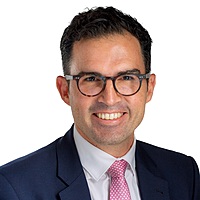The yields in this asset class haven't been this high for 15 years
Yields are "definitely higher" than they have been in years in fixed income, with central banks hiking base rates and credit spreads widening over the past year.
That's according to Teiki Benveniste, the head of Ares Australia Management, who notes investors can achieve an annual income of 7-8%(1) plus the potential for capital gains as assets move closer to maturity by investing selectively in the global credit universe.
"If you look at the syndicated loan market, for example, we are in the 95th percentile of yields compared to historical levels since the Global Financial Crisis," Benveniste said.
But how long can the good times last? And, given there could be a recession on the horizon, will fixed income investors face the "zombie apocalypse" some market commentators have predicted?
As part of Livewire's fifth annual Income Series, I sat down with Benveniste for his outlook on the global rate cycle, why he isn't fearful of a mass default outbreak, as well as where he is finding the best global credit opportunities today.
Note: This interview was recorded on 29th May 2023. You can watch the video or read an edited transcript below.
Teiki's outlook on the interest rate cycle
While Benveniste acknowledged that inflation has been stickier than expected, he argued that many leading indicators are now pointing to a potential moderation in inflation.
This includes factors such as declining commodity prices, a cooling global housing market (not that we are seeing that here in Sydney), and a softening job market - all of which suggest inflation could be on the way south in the coming months - and would ultimately see rates head lower with it.
"We're continuing to monitor this quite closely and trying to see what the impact could be to credit markets," Benveniste said.
"But where our attention is really going is more towards the earning cycle and the fact that in the next few quarters, there might be some softening in the earning cycle. What impact does that have on credit and borrowers? And what will be the impact of that on default rates going forward?"
Will we see default rates skyrocket as market commentators fear?
Benveniste is adamant that while default rates may increase from their "extremely low levels," they are unlikely to reach a catastrophic scale.
"We're probably going to move back to historical averages of 3.5% to 4.5% per annum of defaults over the next 12 months across leverage loans and high-yield bond markets. That's reasonable given the increase in interest rate payments that those companies have to face," he explained.
However, this risk is already being priced in credit spreads by the market, he added.
"You look at the loan market, for example, credit spreads are at 630 basis points," Benveniste said.
"That's in the 85th percentile compared to historical levels since the GFC. So clearly, the market is pricing in higher default rates going forward."
Benveniste explained that the fundamentals of the credit market, such as leverage levels, interest coverage ratios, and loan maturity dates, currently do not support a "zombie apocalypse" scenario, but rather a "milder" default cycle.
"You basically have had a situation where with COVID, companies came to the market, refinanced their debt and pushed their maturities into the future," he said.
"So you don't really have a wall of maturities coming at you, resulting in 10-15% defaults which we saw in the GFC, when the market shut."
What's more, the ability of these companies to service their debt is holding up well compared to historical levels, Benveniste added.
"So if we're going into a recession, we're going into a recession with levels of fundamental readings that we believe don't support this zombie apocalypse scenario," he said.
Australia versus global credit (and how Benveniste is positioned today)
Ares Australia Management has nimbly adapted to the market's many challenges since launching the Ares Global Credit Income Fund ("the Fund") in May 2020.
While initially investing significantly in fixed-rate corporate bonds, the portfolio then adjusted to floating-rate instruments in 2021 - which Benveniste describes as boasting "less interest rate duration and if rates go up, they don't suffer the same mark-to-market volatility and also benefit from higher coupons."
In 2022, the team stuck to their knitting when fears around credit grew, resulting in wider spreads and negative mark to market. The floating rate instruments they held, benefitted from higher income generation, helping to cushion some of the mark-to-market volatility on the pricing side.
"Right now, you look at the coupon generated, it's about 7.6% for the Global Credit Income Fund, and then the average price of the loans, bonds and alternative credit instruments that we hold in the Fund is 96.50 cents on the dollar. So they have a nominal value of 100 and they're being priced below their nominal value," Benveniste explained.(2)
So, why global credit over the homegrown alternative?
The credit manager is able to invest in opportunities both locally and offshore, and while Benveniste notes that the Australian market offers solid growth prospects and a more attractive legal regime for secured lenders, it is smaller and less liquid than the US market, and diversification can be problematic as well.
"It's a much more concentrated market here in Australia compared to the US$5.8 trillion opportunity across the US and European syndicated loan, high-yield bond, and alternative credit markets," Benveniste said.
"Both markets are complementary. And what we've tried to do with the Ares Global Credit Income Fund is bring a solution that will complement a domestic strategy and give Australian investors access to something different by focussing on the higher quality part of those global markets, providing investors with yield enhancement and diversification benefits."
Opportunities and risks
Benveniste's eyes are on the prize, and in this case, it's all about income - which he notes, isn't too difficult to achieve today given the "high levels of current income at the moment" within the asset classes in scope for the Fund.
He believes the syndicated loan market is the most attractive investment opportunity from a relative value perspective at the moment - which is currently generating yields in the 85th percentile compared to history since the Global Financial Crisis.
"We also really like what we can get in the alternative credit space," Benveniste said.
Currently, you can get an extra 3% or 300 basis points just by investing in, for example, a BBB-rated structured credit instrument over a BBB-rated corporate bond, he explained.
"So for us, that screams attractive relative value and therefore we do have a large allocation in the Fund to those markets," he said.
Last but not least, he points to heavily discounted fixed rate instruments as another area of opportunity.
"What we like in the high-yield bond market is that you can find short-dated paper that is trading at deep discounts," he said.
"Which gives you that potential for... some level of capital gain, but that's more of an accent to the portfolio. It's not the main allocation, but we're able to invest in those parts of the market as well."
On the other side of that, Benveniste is avoiding credit within cyclical industries - or companies that have become overstretched in recent times.
"Really, it's going to come down to credit selection," he said.
"These are the markets where credit selection is absolutely crucial because you've got a great opportunity set with wide spreads, but then the risk you're taking is the default risk."
"When we manage this portfolio... it's about income. That's where we want returns to come from," he said.
"Income is the most stable part of your returns compared to capital gains. So what we've done is in this Fund, we've built the Fund's returns around current income."
Consistent income throughout market cycles
To learn more about how Ares Australia Management navigates inefficiencies in the market to generate attractive, income-producing portfolios please visit their website or Fund profile below.

More from Income Series
- Private Credit: a smart choice
- How we are meeting property developer demand in the age of the "slow no"
- We've returned 9.6%* pa to investors without sacrificing on security. Here's how we do it
- The housing supply and demand imbalance... and how to play it
- Income Series: View the list of 22 Managed Funds, LITs, LICs & ETFs
3 topics
1 fund mentioned
1 contributor mentioned


